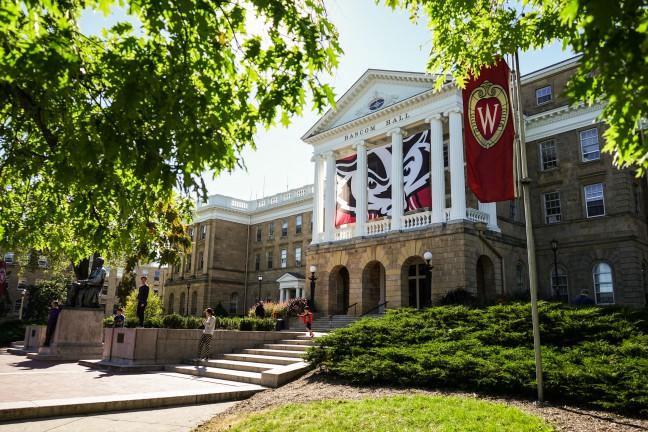The flow of educational resources throughout Wisconsin does not stop at the halls of its university campuses. For over 100 years, Wisconsin’s universities have done outreach that connects farmers, families, youth and businesses to university research. The branch that facilitates this is known as the Division of Extension.
Originally tied to the initial land grant mission of the University of Wisconsin-Madison, UW-Extension was designed to share information with the wider community.
UW-Extension has offices in each of Wisconsin’s 72 counties and in three of its tribal nations, according to its website. A wide variety of educational programming is organized by Extension offices all over the country.
Carrie Edgar, the director of the Dane County Extension office, says the Extension program that most people are probably familiar with is the 4-H Program.
“It’s the largest youth development program in the country and is in all 50 states,” Edgar said.
Children as young as five years old can begin participating in youth development programs through 4-H. For middle and high schoolers, 4-H provides many outlets to work with animals, like showing cattle and horses at fairs, training dogs, raising chickens and selling pigs.
For teens inclined toward the arts, 4-H provides opportunities for writing and performing poetry, prose and speeches.
Dane County’s youth have the opportunity to influence 4-H funding priorities in a program called By Youth For Youth. According to the website, high school students who participate in BYFY are able to exercise leadership skills by identifying needs in their peer communities and recommending funding allocation to specific programs.
Each year, BYFY directs $30,000 in funding toward projects that benefit Dane County. In the 2016-2017 school year, according to the website, some of BYFY’s main funding priorities were racial equity, education and opportunities for economically disadvantaged youth.
Board of Regents votes to invest in student services for UW Colleges, Extension
Leadership-minded high school students of Dane County can also participate in 4-H’s Youth Governance Program, which was modeled after a similar program in Kenosha County in 2012.
Representatives of the program attend meetings for a specific Dane County Board Committee for one year and are able to cast advisory votes that are recorded in the minutes but are non-binding.
In Wisconsin, there is a large focus on agricultural and horticultural education. Dane County Extension facilitates gardening education for local youth in school and after school as well as the community at large. UW-Madison students can sign up for Master Gardener Volunteer Training through Extension and develop horticultural projects that serve the community.
Extension’s biggest role in Wisconsin agriculture is to apply university research to real farms. Farmers throughout the state have implemented agricultural research that was developed by specialists and researchers housed on campus at UW-Madison.
“Here in Dane County, we work with a lot of vegetable farms and we try to figure out which cover crops work best,” Edgar said. “All of the programming that we provide is evidence-based and research-driven, so we work closely with faculty on campus. The tie is very close.”
Another focal point in Dane County programming is nutrition education. Nutrition programming is funded by a federal grant, Edgar said. Educators work in schools, community centers, and senior centers, working with individuals and families to develop healthy eating habits and food budgets, per the website. Financial education programming is also widespread in Dane County.
UW-Madison students can get involved in community development with Extension by volunteering as well as by applying for internships. Edgar said this year’s summer interns are working on projects involving community health, financial education, youth development and community-based nonprofits.
“Sometimes we have a project and we will put out a call, and sometimes we get approached by an intern who says they have an idea and they’d like to partner with Extension,” Edgar said. “We really enjoy working with interns.”
Summer internships are typically paid, though in the past there have been unpaid internships through Extension that compensate in credit hours. UW-Madison students can also volunteer in the 4-H program and a wide variety of gardening programs.
Extension also hosts a number of events that are open to the public, which UW-Madison students can attend.
“There are things like the Wisconsin Science Festival, events at county fairs — all are open to the public,” Edgar said.
The Wisconsin Science Festival takes place for four days in locations throughout the state. Exhibitions, workshops, performances, and more with a focus on science and discovery are free to attend, with many taking place at Madison’s own Discovery Building.
In 2018, there were 33,000 attendees at the statewide festival that consisted of more than 250 individual events. The festival is a popular field trip destination, as all ages are welcome to attend. The 2019 festival will be taking place October 17-20.
Extension’s role in the festival is behind-the-scenes.
“UW-Extension is often used as a resource for finding scientists from around the state for various events,” Courtni Kopietz, a multimedia specialist at the Morgridge Institute, said.
Extension also has a role in seeking out scientists for UW-Madison’s Weekly Science Talks.
Edgar said some UW-Extension events cost money and may require pre-registration, but for the majority of them, “you can just show up.”













